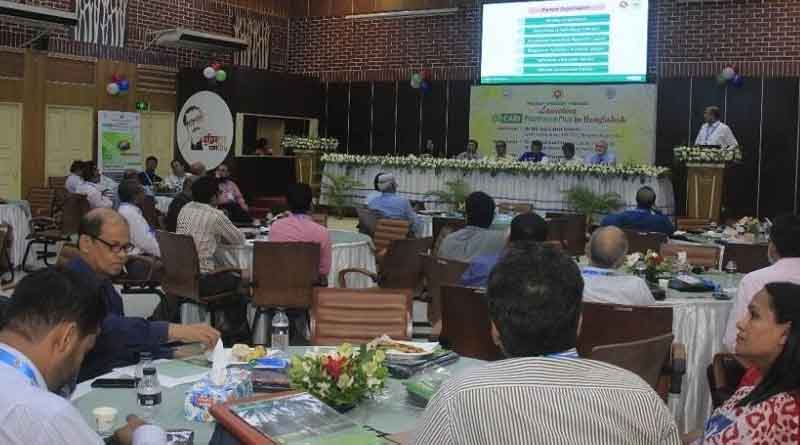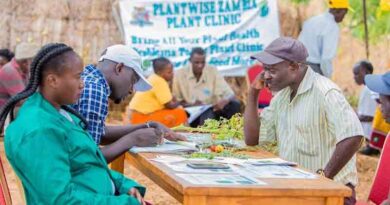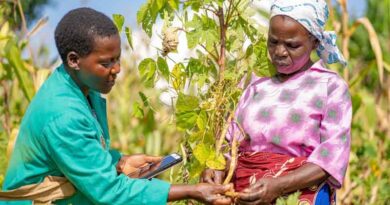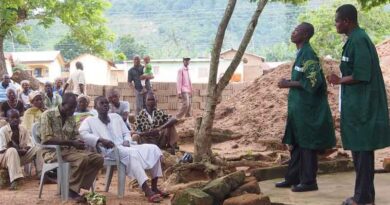Launch of PlantwisePlus in Bangladesh to help increase climate-smart approach to plant health and food security
27 September 2023, Bangladesh: The launch of the CABI-led PlantwisePlus programme in Bangladesh will build on the success of the Plantwise programme to provide knowledge and tools to help Bangladesh predict, prevent, and prepare for plant health threats and reduce crop losses.
The programme will ensure farmers not only produce more food but also improve its quality. This will be delivered through a gender-sensitive and climate-resilient approach.
PlantwisePlus, which will help smallholder farmers in Bangladesh adopt more sustainable ways to mitigate crop pests and diseases, such as the devastating fall armyworm, was launched at the auditorium of the Bangladesh Agricultural Research Council (BARC).
Md. Ruhul Amin Talukder, Additional Secretary of the Ministry of Agriculture, was the chief guest and was joined by Dr Shaikh Mohammad Bokhtiar, Executive Chairman of BARC, Debasish Sarker, Director General of the Bangladesh Agricultural Research Institute (BARI), and Md Tajul Islam Patwary, Director General of the Department of Agricultural Extension (DAE).
CABI staff Dr Malvika Chaudhary, Regional Coordinator Asia for Plantwise, Dr Saleh Ahmed, CABI Associate in Bangladesh, and Dr Keith Holmes, Crop Health Advisor, were at the launch to highlight the benefit of resources within the PlantwisePlus Toolkit and ongoing partnerships to implement various PlantwisePlus interventions.
It was highlighted how digital tools such as the CABI Academy, CABI BioProtection Portal, PlantwisePlus Knowledge Bank, and Crop Sprayer App, can help Bangladesh strengthen systems for the detection and response to pest outbreaks.
The tools can also develop the capacity for systems for local production and distribution of low-risk plant protection products as part of an Integrated Pest Management (IPM) approach to mitigating crop pests and diseases.
Crop health in Bangladesh has never been more important with the agricultural sector employing nearly half of the country’s population. More than 70% of the land in Bangladesh is dedicated to a range of crops including rice, wheat, pulses and oil seed.
However, climate change is badly affecting the country. Changing weather patterns and spreading crop diseases and pests threaten its crops. CGIAR, for instance, regards Bangladesh as “one of the most vulnerable countries in the world to climate change and variability.”
CABI has been active in Bangladesh for many years. With support from CABI, the Plant Protection Wing of the Department of Agricultural Extension (DAE) has been working with Plantwise for the past nine years.
Mr Mohammed Shafiuzzaman, the DAE official in charge for implementing PlantwisePlus and activities, reflected on the digital tools which have introduced frontline extension officers to digital learning where they are able to learn modules on field diagnosis at the farm level and minimize crop losses.
Recently the extension staff has profited by scaling up of new modules introducing them to bioprotection products. More than 2,000 SAAO have already completed the course through this ongoing initiative.
Increasing the number of plant clinics throughout the country, will further support Bangladesh to predict and prevent plant health threats. This will reduce crop losses, increase livelihoods and, ultimately, help towards greater food security.
So far, Plantwise has trained 8,000 sub-assistant agricultural officers (SAAOs), 900 of whom are women. CABI, combining with Farmers’ Information and Advice Centres (FIAC) and other ongoing projects of the DAE have also established over 700 plant clinics where farmers can get help to diagnose and remedy their plant health problems.
Further work under the PlantwisePlus programme has seen the rollout of the CABI Academy across Bangladesh where this resource has been helping to train the SAAOs as plant doctors.
Other initiatives that are underway to further strengthen collaboration for PlantwisePlus with public and private partners in Bangladesh include the use of the CABI Horizon Scanning and Pest Risk Analysis tools.
It also includes the control of the insects/pests by biological control agents. Collaborations and partnerships should support governments and farmers in a changing climate.
Mr Shaikh Mohammad Bokhtiar said, “The PlantwisePlus programme will assist smallholder farmers in receiving pest management and biopesticide advice. Our commitment will be to profitable and sustainable agriculture.
“Every year, we use 38,000 tonnes of chemical pesticides, and the trend is downward. Bangladesh seeks smart agriculture that makes the best use of agri-inputs.
“CABI can help governments with research, funding, and relationship development. Our scientists, extension workers, and other stakeholders can be thoroughly trained and their expertise for sustainable agricultural growth can be enhanced through the PlantwisePlus initiative.”
In total, around 100 participants were at the launch of PlantwisePlus in Bangladesh. These also included representatives from the Food and Agriculture Organization of the United Nations (FAO), the International Fund for Agricultural Development (IFAD), CIMMYT, agricultural universities and others.
Earlier this month, also as part of work under the PlantwisePlus programme, CABI joined forces with a range of partners to deliver a consumer food safety workshop ahead of a survey to assess food safety practices in Bangladesh.
CABI joined colleagues, from the (DAE), Plant Quarantine Wing (PQW), Bangladesh Food Safety Authority (BFSA) and Development Technical Consultants Pvt. Ltd. (DTCL), for the two-day event.
Also Read: Consistent growth in agriculture boosts economic resilience: PHD Chamber
(For Latest Agriculture News & Updates, follow Krishak Jagat on Google News)














